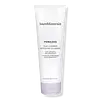What's inside
What's inside
 Key Ingredients
Key Ingredients

No key ingredients
 Benefits
Benefits

 Concerns
Concerns

 Ingredients Side-by-side
Ingredients Side-by-side

Water
Skin ConditioningGlycerin
HumectantStearic Acid
CleansingMyristic Acid
CleansingLauric Acid
CleansingPotassium Hydroxide
BufferingGlyceryl Stearate Se
EmulsifyingPEG-6
HumectantPEG-32
HumectantSodium Methyl Cocoyl Taurate
CleansingSodium Phosphate
BufferingParfum
MaskingPolyquaternium-7
Tetrasodium EDTA
Dipropylene Glycol
HumectantButylene Glycol
HumectantSodium Benzoate
MaskingAcetyl Glucosamine
Skin ConditioningPrunus Persica Leaf Extract
EmollientWater, Glycerin, Stearic Acid, Myristic Acid, Lauric Acid, Potassium Hydroxide, Glyceryl Stearate Se, PEG-6, PEG-32, Sodium Methyl Cocoyl Taurate, Sodium Phosphate, Parfum, Polyquaternium-7, Tetrasodium EDTA, Dipropylene Glycol, Butylene Glycol, Sodium Benzoate, Acetyl Glucosamine, Prunus Persica Leaf Extract
Water
Skin ConditioningGlyceryl Stearate Se
EmulsifyingGlycerin
HumectantGlycol Distearate
EmollientPEG-60 Glyceryl Isostearate
Butylene Glycol
HumectantPEG-32
HumectantPEG-6
HumectantMyristic Acid
CleansingCetyl Alcohol
EmollientPPG-15-Buteth-20
Skin ConditioningCoconut Acid
CleansingSodium Methyl Cocoyl Taurate
CleansingKaolin
AbrasiveStearyl Alcohol
EmollientTocopherol
AntioxidantBHT
AntioxidantSaccharum Officinarum Extract
MoisturisingLeuconostoc/Radish Root Ferment Filtrate
AntimicrobialVaccinium Myrtillus Fruit Extract
Skin ConditioningCitrus Aurantium Dulcis Fruit Extract
MaskingCitrus Limon Fruit Extract
MaskingMorinda Citrifolia Leaf Extract
Skin ConditioningAcer Saccharum Extract
Skin ConditioningSalvia Hispanica Seed Extract
EmollientSuccinoglycan
Skin ConditioningCalcite
Skin ConditioningIllite
AbrasiveSilica
AbrasiveMontmorillonite
AbsorbentDisodium EDTA
Potassium Hydroxide
BufferingPhenoxyethanol
PreservativeCI 77891
Cosmetic ColorantWater, Glyceryl Stearate Se, Glycerin, Glycol Distearate, PEG-60 Glyceryl Isostearate, Butylene Glycol, PEG-32, PEG-6, Myristic Acid, Cetyl Alcohol, PPG-15-Buteth-20, Coconut Acid, Sodium Methyl Cocoyl Taurate, Kaolin, Stearyl Alcohol, Tocopherol, BHT, Saccharum Officinarum Extract, Leuconostoc/Radish Root Ferment Filtrate, Vaccinium Myrtillus Fruit Extract, Citrus Aurantium Dulcis Fruit Extract, Citrus Limon Fruit Extract, Morinda Citrifolia Leaf Extract, Acer Saccharum Extract, Salvia Hispanica Seed Extract, Succinoglycan, Calcite, Illite, Silica, Montmorillonite, Disodium EDTA, Potassium Hydroxide, Phenoxyethanol, CI 77891
 Reviews
Reviews

Ingredients Explained
These ingredients are found in both products.
Ingredients higher up in an ingredient list are typically present in a larger amount.
Butylene Glycol (or BG) is used within cosmetic products for a few different reasons:
Overall, Butylene Glycol is a safe and well-rounded ingredient that works well with other ingredients.
Though this ingredient works well with most skin types, some people with sensitive skin may experience a reaction such as allergic rashes, closed comedones, or itchiness.
Learn more about Butylene GlycolGlycerin is already naturally found in your skin. It helps moisturize and protect your skin.
A study from 2016 found glycerin to be more effective as a humectant than AHAs and hyaluronic acid.
As a humectant, it helps the skin stay hydrated by pulling moisture to your skin. The low molecular weight of glycerin allows it to pull moisture into the deeper layers of your skin.
Hydrated skin improves your skin barrier; Your skin barrier helps protect against irritants and bacteria.
Glycerin has also been found to have antimicrobial and antiviral properties. Due to these properties, glycerin is often used in wound and burn treatments.
In cosmetics, glycerin is usually derived from plants such as soybean or palm. However, it can also be sourced from animals, such as tallow or animal fat.
This ingredient is organic, colorless, odorless, and non-toxic.
Glycerin is the name for this ingredient in American English. British English uses Glycerol/Glycerine.
Learn more about GlycerinGlyceryl Stearate Se is a self-emulsifying (SE) form of glyceryl stearate. Self-emusifying means this ingredient automatically blends with water. It is an emulsifier, emollient, and cleansing agent.
As an emulsifier, Glyceryl Stearate Se prevents ingredients such as oil and water from separating. It is also a surfactant, meaning it helps cleanse the skin. Surfactants help gather oil, dirt, and other pollutants so they may be rinsed away easily.
Emollients help your skin stay smooth and soft. It does so by creating a film on top of the skin that helps trap moisture in.
Learn more about Glyceryl Stearate SeMyristic Acid is a saturated fatty acid. It is naturally found in milk fat. Other sources include palm oil, coconut oil, and butter fat.
Myristic Acid is an emulsifer and cleanser. As an emulsifer, it stabilizes a product by preventing ingredients from separating. Myristic Acid helps clean your skin by acting as a surfactant. It tends to gather oil and dirt on your skin to be easily rinsed away.
One study from 2021 found Myristic Acid to have anti-inflammatory properties.
Learn more about Myristic AcidPEG-32 is a synthetic and water-soluble polymer with 32 repeating units. It has humectant, solvent, and emulsifying properties.
As a solvent and emulsifier, it helps dissolve and blend ingredients. It is also able to attract water as a humectant to help hydrate skin. According to a manufacturer, this ingredient is non-greasy, gentle, and mildly scented.
Japanese manufacturers will sometimes call this ingredient PEG 1540.
Learn more about PEG-32We don't have a description for PEG-6 yet.
Potassium hydroxide is commonly known as caustic potash. It is used to fix the pH of a product or as a cleaning agent in soap. In cleansers, it is used for the saponification of oils.
Sapnification is the process of creating fatty acid metal salts from triglycerides and a strong base. During this process, Potassium Hydroxide is used up and is not present in the final product.
Using high concentrations of Potassium Hydroxide have shown to irritate the skin.
Learn more about Potassium HydroxideThis gentle cleansing and foaming ingredient is known for leaving a smooth feeling in skin and hair. It is made using coconut oil.
According to the manufacturer, it is soluble in water and has resistance to hard water, acid, and alkali.
Due to its coconut base, it may not be Malassezia folliculitis safe.
Learn more about Sodium Methyl Cocoyl TaurateWater. It's the most common cosmetic ingredient of all. You'll usually see it at the top of ingredient lists, meaning that it makes up the largest part of the product.
So why is it so popular? Water most often acts as a solvent - this means that it helps dissolve other ingredients into the formulation.
You'll also recognize water as that liquid we all need to stay alive. If you see this, drink a glass of water. Stay hydrated!
Learn more about Water